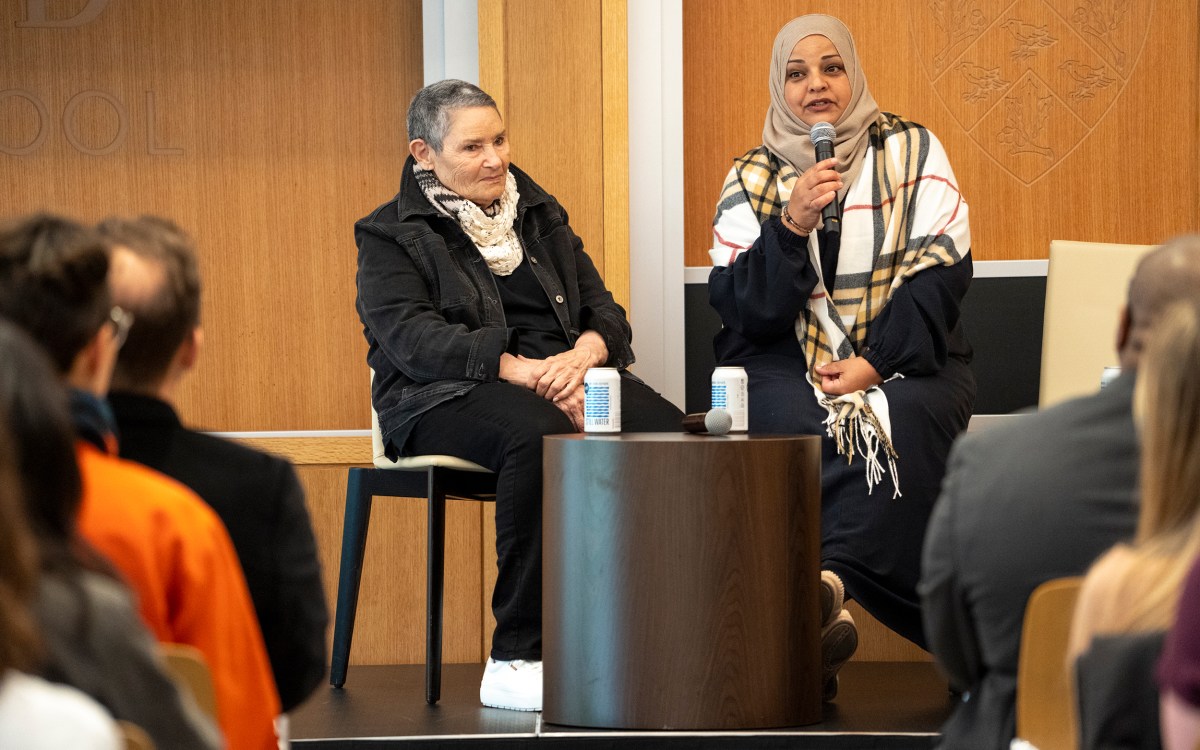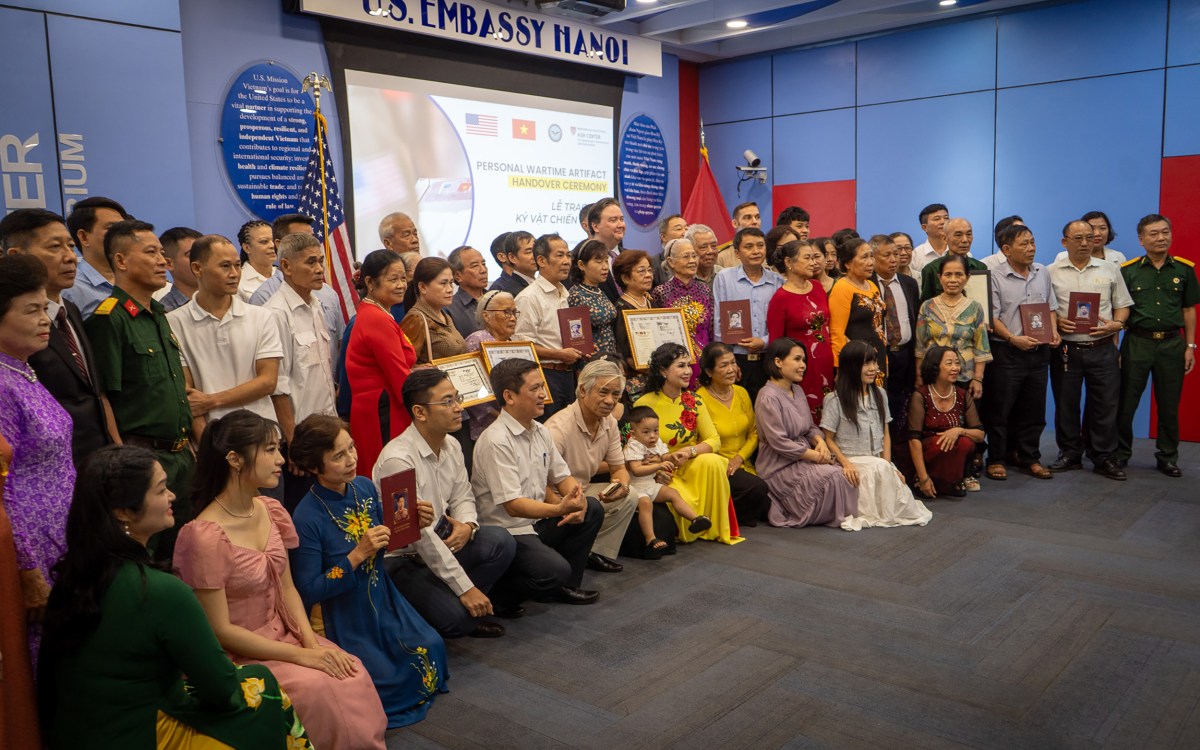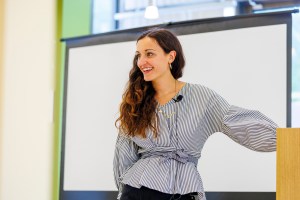Nation & World
-

A tale of three cities — and their turn to right in heartland
Government professor’s new book focuses on roles of race, class, and religion in evolution of former New Deal Democrats
-

Why do election polls seem to have such a mixed track record?
Democratic industry veteran looks at past races, details adjustments made amid shifting political dynamics in nation
-

You’d never fall for an online scam, right?
Wrong, says cybersecurity expert. Con artists use time-tested tricks that can work on anyone regardless of age, IQ — what’s changed is scale.
-

Two bereaved mothers who know price of war work for peace
Layla Alsheikh, Robi Damelin argue path to Mideast reconciliation begins with acknowledging common humanity
-

Taking the phones out of school
In podcast episode, experts discuss growing movement to restrict devices in class
-

‘The first new information we’ve heard in 50 years’
Unseen Legacies researchers are answering decades-old questions about the fates of Vietnamese soldiers
-
‘Is Afghanistan Lost?’
At a panel discussion Monday at the Harvard Kennedy School, Maleeha Lodhi evoked Lewis Carroll’s Cheshire Cat to describe the situation on the ground in Afghanistan.
-
Revising Japan’s constitution: History, headlines, and prospects
For months now, the pirates operating off the coast of Somalia have been making trouble for the world’s maritime shipping network. Now it appears their grappling hooks may have gotten entangled in another, very different web: the complicated question of revision of the Japanese constitution, specifically of Article 9, which contains the “renunciation of war” clause.
-
Davis, Dupree help Carr Center fight human trafficking
Through their generous support, the Carr Center’s Initiative to Stop Human Trafficking at the Harvard Kennedy School (HKS) will fund student research projects on human trafficking issues through the Sunny Dupree Policy Analysis Exercise (PAE) award.
-
Nigerian lawyer is a champion of women
In 2002, a young Nigerian woman by the name of Amina Lawal — pregnant and unmarried — was tried for adultery under Shariah, Islam’s traditional law. She was sentenced to be stoned to death, a fate that briefly riveted the attention of media worldwide.
-
Seminar focuses on human rights
The undergraduates who gather around the seminar table at 61 Kirkland St. have a lot on their minds. Not just final papers, athletic matches, and music performances, but a range of issues that run far beyond the daily stresses of college: Refugee resettlement. Human trafficking. Child soldiers. These human rights issues — along with many others — are the challenges that have inspired this group of passionate students to add another course to their jam-packed schedules.
-
Images of terror through the eyes of children
Basma was 8 when Janjaweed fighters on horseback swept into her village in the Darfur region of Sudan. Above them, helicopter gunships joined in the attack.
-
N.E. HUD chief offers suggestions
The chief federal housing official in New England told a Harvard University audience that his department is poised to help foreclosure-imperiled homeowners navigate the nation’s economic crisis, but he called on President-elect Barack Obama to empower that effort by expanding the nation’s commitment to fair and affordable housing.
-
Tanner lecturer, peacemaker Nusseibeh in search of the improbable
Prior to delivering the first of this year’s Tanner Lectures, political activist Sari Nusseibeh gave the audience a laugh — and a cheat sheet. “My normal attitude in lectures is to doze off when someone is reading them,” he quipped, “so if you do doze off I just want to tell you that my message in these two lectures is very simple, very straightforward: it’s that we — people, human beings — are in charge of our lives.”
-
Post-election: What’s changed, what’s stayed the same
Barack Obama will enter the White House in January with the strongest mandate of any Democratic president at least since Lyndon Johnson in 1965, and arguably since Franklin Delano Roosevelt in 1933. Signs of a generational alignment, like the ones that made “Roosevelt Democrat” or “Reagan Republicans” household words are apparent.
-
Redressing five centuries of injustice: A start
On May 4, 1493 — less than a year after Columbus set foot in the New World — Pope Alexander VI issued “Inter Caetera,” a papal bull that still resonates more than five centuries later.
-
Rights champion Goldstone speaks
In human rights terms, Richard J. Goldstone, the 70-year-old veteran of South Africa’s highest courts and a visiting professor at Harvard Law School, has walked the walk and talked the talk — chiefly by having a role in a number of this generation’s most important humanitarian events.
-
Teach For America’s Kopp describes what works, what will work
The woman who created a national teaching movement out of her college thesis was on campus last week to advocate for broader support for public education. Wendy Kopp, founder and CEO of Teach For America (TFA) addressed a standing-room-only crowd at the Harvard Graduate School of Education’s (HGSE) Askwith Forum at Longfellow Hall on Nov. 3. Many in the audience were education administrators, teachers, and students.
-
New president, new challenges
In introducing the featured speaker at last week’s (Oct. 29) John F. Kennedy School Forum, Graham Allison, director of the Belfer Center for Science and International Affairs, said, “If there were a really serious national security problem and we could only consult one person, that person, in my view, is Brent Scowcroft.”
-
Post-colonial wars parsed at Radcliffe
Last week, a two-day interdisciplinary conference on post-colonial wars got under way at the Radcliffe Institute for Advanced Study. The Oct. 30-31 event was the capstone of two years of private meetings at Radcliffe by high-level experts on the wars that followed independence movements in Africa and Asia after World War II.
-
Obama joins list of seven presidents with Harvard degrees
When sworn in on Jan. 20, Barack Obama will join current President George W. Bush (M.B.A. ’75) and Presidents John Adams, John Quincy Adams, Rutherford B. Hayes, Theodore Roosevelt, Franklin D. Roosevelt, and John F. Kennedy as Harvard graduates chosen to serve as the nation’s chief executive.
-
Voter turnout approaches some records, breaks others
Voter turnout in the 2008 presidential election was not record-breaking, but it appears that it will approach the roughly 67 percent of the eligible citizenry who voted in 1960.
-
Spirited discussion brings some clarity to Obama’s strategy on Middle East
In the final days before the U.S. presidential election, the two leading candidates were too busy dashing from one rally to the next in a few battleground states to make it to the reliably blue Bay State in person.
-
Chall Lecture focuses on the future of literacy achievement gap
Research shows that there have been positive trends in literacy achievement in the past 25 years. These gains, however, have not included a significant closing of the gaps between racial, ethnic, and socioeconomic groups, a fact that represents a serious issue in education today.
-
Election 2008 excitement
Harvard students came together and tuned in to the national media at Election Night 2008 gatherings that ranged from small and quiet to large and loud, ultimately spilling into Harvard’s Yard and Square.
-
Green politics at IOP
An environmental call to action issued by Harvard President Drew Faust accelerated this year, with a pledge to reduce campus-wide greenhouse gas emissions and with an October celebration of sustainability efforts.
-
IOP survey finds concerns over economy skyrocket
A new national poll by Harvard University’s Institute of Politics (IOP), located at Harvard Kennedy School (HKS), finds that 18- to 24-year-old likely voters continue to prefer U.S. Sen. Barack Obama (56 percent) over U.S. Sen. John McCain (30 percent) in the race for president. Economic issues are far and away the No. 1 national issue of concern for young people — over 10 times more important today (53 percent) than they were just one year ago (5 percent).
-
Nunn wants to eliminate nukes
Sam Nunn, former Democratic senator from Georgia (1973-97), is well known as an eminence in the realm of U.S. security policy.
-
Dynamics of a changing workforce laid out in forum
Lawrence Mishel, president of the Economic Policy Institute in Washington, D.C., didn’t actually use the phrase “I told you so” in his remarks at a panel discussion on labor issues at the Harvard Business School last week. But he cited some evidence that the national economics discussion is coming around to his way of looking at things — and not just because of the current credit crisis.
-
HBS summit addresses future
The timing couldn’t have been worse, or perhaps better, for Harvard Business School’s (HBS) “Centennial Global Business Summit,” a three-day conference Oct. 12-14.
-
Secretary of education proposes simplified aid form
U.S. Secretary of Education Margaret Spellings addressed concerns ranging from college financial aid to No Child Left Behind during a lecture at Harvard Kennedy School (HKS) Oct. 1.
-
Leadership panel to advise on business, human rights
John Ruggie, U.N. Secretary-General Ban Ki-moon’s special representative for business and human rights, recently announced that he is convening a leadership panel to advise him on how best to ensure that businesses worldwide respect internationally recognized human rights standards.
-
History of human rights declaration is reviewed at CGIS
In September 1948, representatives of 18 nations at the newly minted United Nations were inspired by the tumult and horror of World War II to create a Universal Declaration of Human Rights (UDHR).
-
Quinn talks to students of various faiths
If she can help it, Washington Post journalist Sally Quinn prefers to avoid the phrase “spiritual journey.” Quinn, who co-moderates the blog “On Faith” with Newsweek editor Jon Meacham, finds the words overused. But she is quick to acknowledge that people’s relationship to faith can change over time — and having interviewed hundreds of scholars, politicians, and other American leaders about their religious viewpoints, she knows that the undergraduate years are often a period of remarkable transformation.
-
Experts attempt to parse the ‘crisis in the markets’
“We’ve been in a slow-motion train wreck … and now it’s just a train wreck.” This quip, by Jay Light, Dwight P. Robinson Jr. Professor of Business Administration and dean of Harvard Business School (HBS), was one of the observations offered at a panel discussion Sept. 25 intended to explain the Wall Street financial crisis to the Harvard community.
-
IOP expands youth effort chronicling ’08 race
Harvard’s Institute of Politics (IOP) recently announced a nationwide expansion of its Campus Voices project, an effort started last fall allowing college students to share their experiences and activities tracking the people and events of the 2008 presidential race. The institute has now expanded the project to serve as a place where students across the country can voice their opinions and report on the different ways young people are politically engaged and active on their campuses and in their states.
